

The Disruption Machine. In the last years of the nineteen-eighties, I worked not at startups but at what might be called finish-downs.
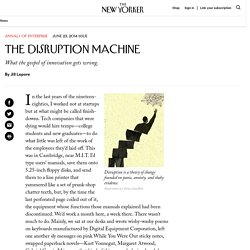
Tech companies that were dying would hire temps—college students and new graduates—to do what little was left of the work of the employees they’d laid off. This was in Cambridge, near M.I.T. I’d type users’ manuals, save them onto 5.25-inch floppy disks, and send them to a line printer that yammered like a set of prank-shop chatter teeth, but, by the time the last perforated page coiled out of it, the equipment whose functions those manuals explained had been discontinued. We’d work a month here, a week there. There wasn’t much to do. Not long after that, I got a better assignment: answering the phone for Michael Porter, a professor at the Harvard Business School. Porter was interested in how companies succeed. Ever since “The Innovator’s Dilemma,” everyone is either disrupting or being disrupted. Most big ideas have loud critics. Why the modern world is bad for your brain.
Our brains are busier than ever before.

We’re assaulted with facts, pseudo facts, jibber-jabber, and rumour, all posing as information. Trying to figure out what you need to know and what you can ignore is exhausting. Sign IN - Open University. Net Generation encountering e-learning at university. Project websites What research questions the project addresses, aims & themes The overall aim of the research was to provide an empirically based understanding of young students, often called the Net Generation or Digital Natives, as they first engage with e-learning in tertiary education.
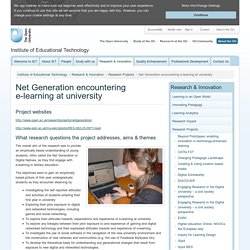
Beyond natives and immigrants: exploring types of net generation students. Net Gen Skeptic: The Net Generation and Web 2.0 Technologies. Research conducted at three Australian universities suggests that the Net Generation are not big users of Web 2.0 technologies, or were not, in 2006.
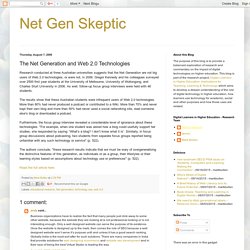
Gregor Kennedy and his colleagues surveyed over 2500 first year students at the University of Melbourne, University of Wollongong, and Charles Sturt University in 2006. As well, follow-up focus group interviews were held with 46 students. The results show that these Australian students were infrequent users of Web 2.0 technologies. More than 80% had never produced a podcast or contributed to a Wiki. More than 70% and never kept their own blog and more than 50% had never used a social networking site, read someone else's blog or downloaded a podcast. Furthermore, the focus group interview revealed a considerable level of ignorance about these technologies. Read the full article here. A Vision of Students Today. The Net Generation encountering e-learning at university. We use cookies to make sure our websites work effectively and to improve your user experience.
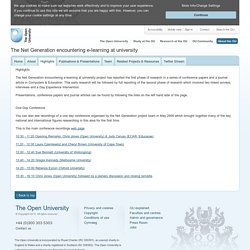
If you continue to use this site we will assume that you are happy with this. Keynote - Gregor Kennedy. First year students' experiences with technology: Are they really digital natives? NetGenHandbookAll.pdf. Teaching/reaching the Net Generation. Teaching/reaching the Net Generation The Net Generation and Digital Natives – these seductive terms need to be approached carefully.
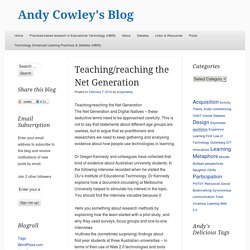
This is not to say that statements about different age groups are useless, but to argue that as practitioners and researchers we need to keep gathering and analysing evidence about how people use technologies in learning. Dr Gregor Kennedy and colleagues have collected that kind of evidence about Australian university students. In the following interview recorded when he visited the OU’s Institute of Educational Technology, Dr Kennedy explains how a document circulating at Melbourne University helped to stimulate his interest in the topic. Viewcontent. Janshs blog: the net generation? H800 activities 5 and 6 based on an interview with Gregor Kennedy and a webcast from Ian Rowlands In his introduction, John Pettit of the Open University outlines the background to Kennedy's research.
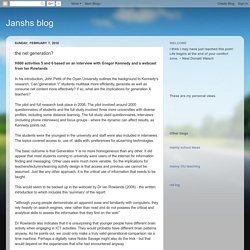
Can 'generation Y' students multitask more efficiently, generate as well as consume net content more effectively? If so, what are the implications for generation X teachers? The pilot and full research took place in 2006. Educating the Net Generation. The Net Generation has grown up with information technology.
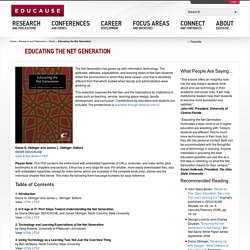
The aptitudes, attitudes, expectations, and learning styles of Net Gen students reflect the environment in which they were raised—one that is decidedly different from that which existed when faculty and administrators were growing up. This collection explores the Net Gen and the implications for institutions in areas such as teaching, service, learning space design, faculty development, and curriculum. Contributions by educators and students are included. The printed book is available through Amazon.com. Diana G. Please Note: This PDF contains the entire book with embedded hyperlinks of URLs, endnotes, and index terms, plus bookmarks to all chapters and sections. Table of Contents. ERM0811.pdf. Monitor: The net generation, unplugged. Totally different from previous generations—or just younger?

THEY are variously known as the Net Generation, Millennials, Generation Y or Digital Natives. But whatever you call this group of young people—roughly, those born between 1980 and 2000—there is a widespread consensus among educators, marketers and policymakers that digital technologies have given rise to a new generation of students, consumers, and citizens who see the world in a different way.
Growing up with the internet, it is argued, has transformed their approach to education, work and politics. “Unlike those of us a shade older, this new generation didn't have to relearn anything to live lives of digital immersion. They learned in digital the first time around,” declare John Palfrey and Urs Gasser of the Berkman Centre at Harvard Law School in their 2008 book, “Born Digital”, one of many recent tomes about digital natives.
425.pdf. Gg_final_keynote_11012008.pdf. Despite The Internet, Google Generation Lacks Analytical Skills. A study conducted by the University College London found that young people lack analytical skills necessary to assess the information they find on the Internet While the so-called "Google Generation" grew up with the Internet, having a sizable chunk of the world's information at their fingertips has failed to make them better thinkers, according to a university study.
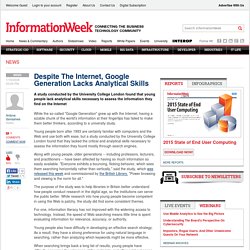
Young people born after 1993 are certainly familiar with computers and the Web and use both with ease, but a study conducted by the University College London found that they lacked the critical and analytical skills necessary to assess the information they found mostly through search engines. Along with young people, older generations -- including professors, lecturers, and practitioners -- have been affected by having so much information so easily available. For one, information literacy has not improved with the widening access to technology.
Young people also have difficulty in developing an effective search strategy. Inventor warns of danger of "Google generation" 'Google Generation' is a myth says research. A report commissioned by Jisc and the British Library counters the common assumption that the ‘Google Generation’ – young people born or brought up in the Internet age – is the most adept at using the web. The report by the CIBER research team at University College London claims that, although young people demonstrate an ease and familiarity with computers, they rely on the most basic search tools and do not possess the critical and analytical skills to assess the information that they find on the web. Information Behaviour of the Researcher of the Future also shows that research-behaviour traits that are commonly associated with younger users – impatience in search and navigation and zero tolerance for any delay in satisfying their information needs – are now the norm for all age-groups, from younger pupils and undergraduates through to professors.
The findings also send a stark message to government - that young people are dangerously lacking information skills. ROUGH TYPE. HOW IS THE INTERNET CHANGING THE WAY YOU THINK? Read any newspaper or magazine and you will notice the many flavors of the one big question that everyone is asking today. Or you can just stay on the page and read recent editions of Edge ... Playwright Richard Foreman asks about the replacement of complex inner density with a new kind of self-evolving under the pressure of information overload and the technology of the "instantly available".
Is it a new self? The Shallows: How the Internet Is Changing the Way We Think, Read and Remember by Nicholas Carr. Do you find it hard to concentrate these days? Do you get fidgety after two pages of a book, and look around for something else to do? Is the online abbreviation "tl;dr" (too long; didn't read) your response to basically everything? If so, Nicholas Carr feels your pain, and has diagnosed the cause: using the internet has rewired your brain and turned you into a flibbertigibbet. The narrative of The Shallows begins with Carr's own feelings ("my concentration starts to drift") and gets only slightly more profound. His argument goes like this: the brain is plastic, and any regular activity changes it. Carr cites a bit of psychology and neuroscience, but he doesn't seem to notice that the study he unveils most triumphantly actually refutes half of his own argument. The internet: is it changing the way we think?
Every 50 years or so, American magazine the Atlantic lobs an intellectual grenade into our culture. Page-20-21.pdf. How computers change the way we learn. Viewcontent. Moore's Law: Beyond the first law of computing - BBC News. Computer chips are arguably both the most complex things ever mass produced by humans and the most disruptive to our lives. Kranzberg’s Six Laws of Technology, a Metaphor, and a Story. Dr. The future of technology? It’s in your hands. If a year is a long time in politics (and it is), then it’s an eternity in communications technology. Fourteen years ago, about 400 million people were using the internet. John Naughton: Thanks, Gutenberg - but we're too pressed for time to read. The First Law of Technology says we invariably overestimate the short-term impact of new technologies while underestimating their longer-term effects.
John Naughton’s online diary. How People Learn. Ar530009.pdf. Shaping Serendipity for Learning: Conversations with John Seely Brown. Photo above: surfers in Maui "Conventional wisdom holds that different people learn in different ways. Thomas_Brown_A_New_Culture_of_Learning.pdf. Learning_in_digital_age-aspen.pdf. El. John Seely Brown: Chief of Confusion. Newlearning.pdf. Growing_up_digital.pdf. CJKoh.pdf. Here Comes Everybody: The Power of Organizing Without Organizations: Clay Shirky: 9780143114949: Amazon.com: Books. Interview: Tara Brabazon. Here Comes Everybody: The Power of Organizing without Organizations.
I am not sure when management consultants colonised publishing and academia. Richard Florida, Charles Leadbeater and Chris Anderson are enthusiasts - cheerleaders - for creativity, collaboration and the market economy. Thoughts on Education, Technology and Development: What is Learning? Sfard.pdf.